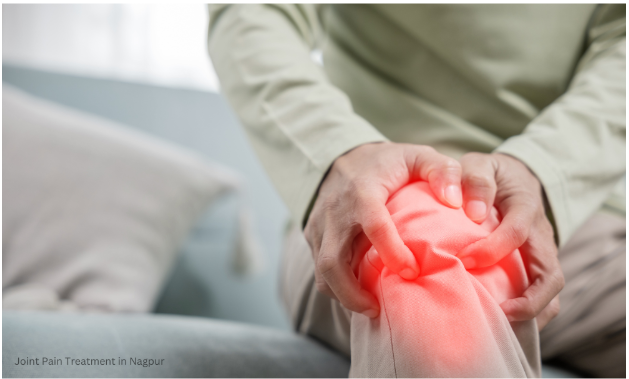Joint Pain Treatment in Nagpur

Causes, Treatments, and Effective Solutions
Joint pain is a common issue affecting people of all ages, often impacting their quality of life and daily activities. Whether caused by age-related conditions, injuries, or underlying health disorders, joint pain requires timely and effective treatment. Nagpur, known for its growing healthcare infrastructure, offers advanced treatments and expert care for joint pain sufferers. In this blog, we will explore the causes, symptoms, and treatments available for joint pain, along with a focus on medications and therapies.
Who Suffers from Joint Pain?
Joint pain is not restricted to any specific age group or demographic. It can affect:
- Elderly Individuals: Due to age-related wear and tear on joints, osteoarthritis is common
Athletes: Overuse injuries and sprains are frequent causes.
Obese Individuals: Excess weight puts additional pressure on weight-bearing joints.
People with Autoimmune Diseases: Conditions like rheumatoid arthritis and lupus often lead to chronic joint pain.
Injury Survivors: Accidents or trauma can cause long-term joint damage.
What Causes Joint Pain?
Identifying the underlying cause of joint pain is crucial for effective treatment.
Arthritis: Osteoarthritis, rheumatoid arthritis, and gout.
Injuries: Ligament tears, fractures, or dislocations.
Inflammation: Tendinitis and bursitis.
Infections: Viral or bacterial infections affecting joints.
Lifestyle Factors: Poor posture, sedentary lifestyle, and excessive physical activity.
Nutritional Deficiencies: Lack of essential vitamins and minerals like Vitamin D and calcium.
Treatments for Joint Pain
The approach to joint pain treatment depends on its cause, severity, and the affected joint. Among the most effective treatment options are:
Lifestyle Modifications: Sustaining an appropriate weight to alleviate stress on the joints. Engaging in consistent low-impact activities such as swimming, cycling, or yoga. Adopting correct posture and ergonomic techniques.
Physical Therapy: A qualified physiotherapist will lead exercises designed to enhance mobility. These will include stretching and strengthening activities aimed at improving joint stability.
Medications: Pain relievers, such as paracetamol, are available without a prescription for mild to moderate pain relief. Non-Steroidal Anti-Inflammatory Drugs (NSAIDs), like ibuprofen and naproxen, help reduce inflammation and pain. Corticosteroids may be administered orally or through injections to address severe inflammation. For autoimmune-related joint disorders, Disease-Modifying Anti-Rheumatic Drugs (DMARDs) are often prescribed to manage symptoms and prevent joint damage.
- Surgical Options: Arthroscopy is a minimally invasive technique utilized for the repair of joints. Joint replacement surgery is frequently performed for individuals suffering from advanced arthritis in the knee or hip.
- Alternative Therapies: Acupuncture, massage therapy, and herbal remedies.
Role of Medications in Joint Pain Management
Medications play a crucial role in joint pain treatment, especially in chronic conditions. Some commonly prescribed medications include:
- Pain Relievers: Paracetamol or NSAIDs for mild to moderate pain relief
Topical Creams and Ointments: Diclofenac gel or capsaicin cream.
Corticosteroid Injections: For severe inflammation and pain.
Supplements: Glucosamine, chondroitin, and omega-3 fatty acids.